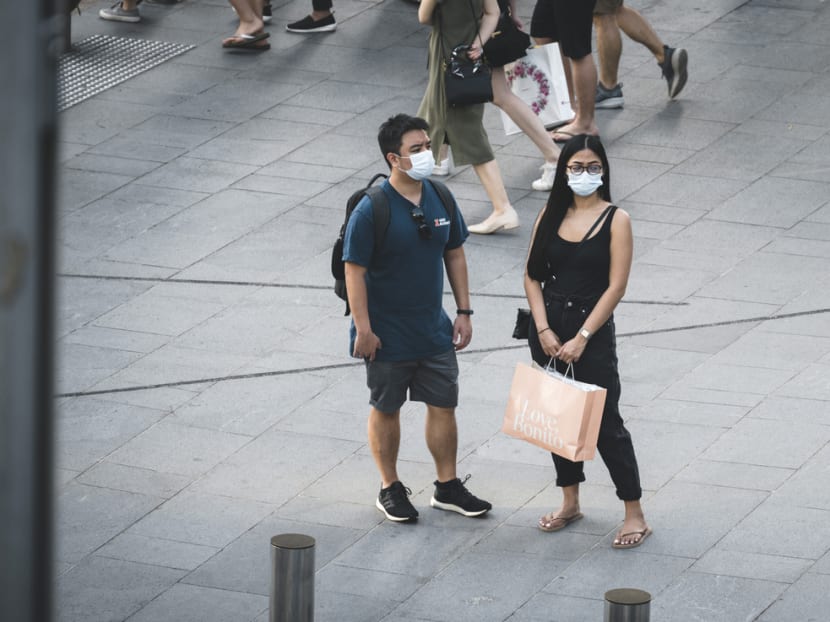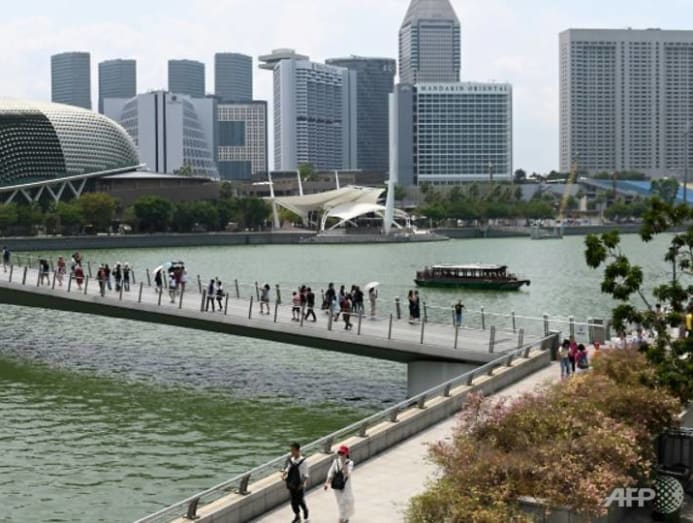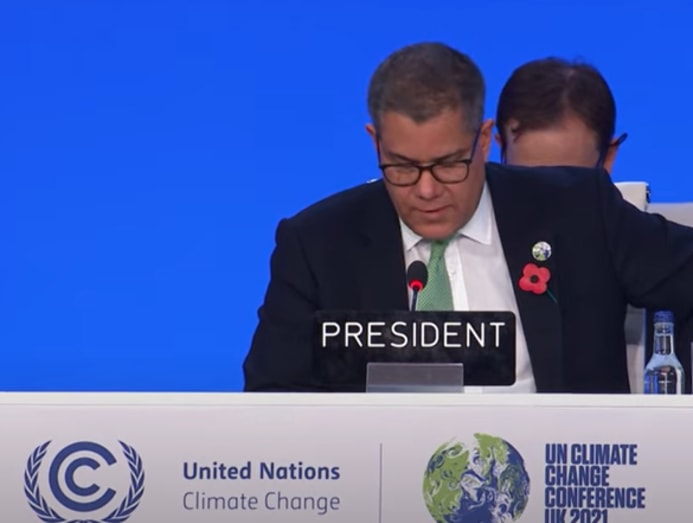Commentary: Faced with a climate emergency, young Singaporeans are rightly thinking twice about having kids
Advertisement
Commentary
Commentary: Faced with a climate emergency, immature Singaporeans are rightly thinking twice about having kids
Polls showing youths are thinking twice near having children should create positive momentum for change – for countries and individuals, says Ng Chia Wee.

A young homo and a young woman at Orchard Route. (Photo: iStock)
01 Dec 2022 06:05AM (Updated: 01 Dec 2022 06:04AM)
SINGAPORE: In his remarks at the opening day of the COP26 Height, U.s.a. President Joe Biden proclaimed that "this is a decisive decade" to flight climatic change.
Whether the earth seizes the opportunity to human activity, or condemns futurity generations to suffer, will be determined in the coming years.
As well the climate emergency, for my generation of youth, this decade will besides exist decisive for much more than personal reasons. This will be the decade when we choose what to written report, where we begin our career, whom we spend our lives with and – the most personal of all – whether we want to take children.
And this last pick is unexpectedly intertwined with the climate emergency.
WARNING SIGNS
According to a recently published survey of 10,000 young people anile betwixt xvi and 25, almost four in 10 respondents were hesitant to have children considering of the climate crisis.
This is the largest scientific study yet on climate anxiety in young people, led by researchers from Bath University and funded past campaigning arrangement Avaaz. Respondents hailed from 10 countries, including Australia, Brazil, India, the Philippines, the Uk and the United States.
Well-nigh six in ten were very or extremely worried nearly climatic change, with iii-quarters like-minded "the future is frightening". More than half also felt they would take fewer opportunities than their parents, while half said their climate feet was affecting their daily lives and functioning.
Looking at the results, I could not help only wonder how Singapore's youth would accept responded.
The results from the TODAY Youth Survey 2021, released on Nov x, provided a clue.
According to the survey of i,066 respondents anile eighteen to 34, 22 per cent of respondents said climate modify was a concern for them when thinking virtually having children.
This is certainly less than the proportion revealed by the study led by Bath University researchers. Withal, for a pocket-size state like Singapore which has a far lower population than many countries, and which can simply count on its human resources, fifty-fifty a figure of 22 per cent should warrant some business organization.

Furthermore, this figure is probable to increase every bit the climate crisis worsens. The COVID-19 pandemic, a dissimilar crisis which unleashed major disruptions, has already prompted some to delay parenthood. 2022 saw 31,816 citizen births, a number iii.1 per cent lower compared to the twelvemonth earlier, and the lowest since 2013.
When the climate crisis becomes similarly confusing, and its effects more keenly felt hither, it is very probable that parenthood concerns stemming from it will rising.
As a sign of their rising prominence, such concerns had already taken heart stage earlier in this yr in the Singapore Repertory Theatre production Lungs, starring Oon Shu An and Joshua Lim. It told the story of a couple deciding whether to take children, while stuck in an existential crisis, which Oon feels "a lot of people" will relate to.
The central question posed by Lungs, every bit captured by Ben Chin in a Popspoken article, is just this: "Is bringing a child into the earth right now, a earth that's struggling with environmental crises, political unrest and general instability the responsible thing to do?"
MORAL DILEMMAS
What is the responsible thing to do?
On the one hand, every couple must have the correct to accept children if they wish to. Information technology is a privilege to give life, and for some, raising children brings incomparable joy.
Societal, cultural and religious influences are present too, and these should not be ignored. For ageing societies like Singapore, an fifty-fifty lower birth rate volition also exacerbate economical pressures stemming from a shrinking workforce.
At the aforementioned time, information technology is perfectly reasonable to question if information technology is morally acceptable to bring a child into this world knowing that he or she will face increasingly severe climate disruptions in his or her lifetime.
Every bit 29-twelvemonth-old Sherilynn Loh had previously told CNA: "There'southward the pandemic, there'southward changes in air quality due to global warming, temperatures rising … And we don't know what that's going to look like xx years from now."
Her sentiment echoes that of Chloe Abigail, who voiced her business concern in an episode of the online talkshow ZULA ChickChats.
"With the way the environment is going towards in terms of climate change … what kind of globe are we leaving backside for our children?" she asked.
The answer to that question continues to hang in the balance, with what was supposed to exist our "last best run a risk" to avert time to come climate catastrophes – COP26 – failing to reach its goal of limiting global warming to ane.5 degrees Celsius in a higher place pre-industrial levels.

EASING THE DILEMMA
With the outlook uncertain, the all-time we can do for now is to brand it a little less pessimistic.
Governments will play a heavy role in this; unsurprisingly, the written report led by Bath University researchers also linked youth climate distress with perceived government inaction.
As COP26 was underway, environmental and climate youth organisations in Singapore issued an urgent call for national leaders to "boldly advance climate activeness" and for youths to "be recognised as equal partners".
The Government should heed this phone call to give youths greater confidence their children will see a less devastating world.
Why practice immature activists feel this passionately near climatic change? They tell us on CNA's The Climate Conversations podcast:
At the same time, youth themselves must do more likewise. True, around lx per cent of our national emissions are industrial, but that should non excuse individuals from also holding themselves to higher standards.
According to the inaugural OCBC Climate Alphabetize released earlier this year, based on an online survey of 2,000 Singaporeans aged 18 to 65, 43 per cent of Gen Z respondents used air conditioning at home for more than than 7 hours a 24-hour interval – the highest proportion among all age groups. Separately, 77 per cent of millennial respondents drove a medium or large vehicle.
Instead of feeling paralysed past the climate-driven moral dilemma of having kids, those who have children could commit themselves to far greener standards in their everyday lives.
Cut down on air travel and private transport, consume less red meat, give up the air-con in favour of fans and natural ventilation, stop indulging in unnecessary flash sale purchases, and pay for eco-friendly products even if they cost more.
While such actions may simply slightly tilt the scales confronting a deteriorating earth, they tin grant us the balls nosotros are doing the best we can for those we brought into that world, and the confidence that our lives are ones where words match deeds.
We can take comfort in the knowledge that nosotros are upholding our responsibleness to set good examples for our children, and are contributing to a virtuous cycle of environmental consciousness when they start to model our behaviour.
However we decide to ease the moral dilemma, the clock will continue to tick – for the globe to tackle the climate emergency, and for us to determine if nosotros want to have kids. For us young people, and the lives we may create, this volition be a decisive decade indeed.
Ng Chia Wee volition begin his concluding twelvemonth of undergraduate education at the National University of Singapore'southward Philosophy, Politics and Economics Programme next January, and is part of the social mobility non-turn a profit organisation Access.
Recent Searches
Trending Topics
Source: https://cnalifestyle.channelnewsasia.com/commentary/climate-anxiety-youths-dont-want-children-293611

0 Response to "Commentary: Faced with a climate emergency, young Singaporeans are rightly thinking twice about having kids"
Post a Comment